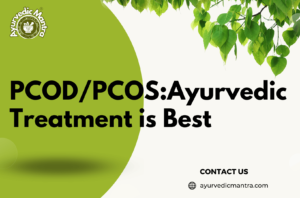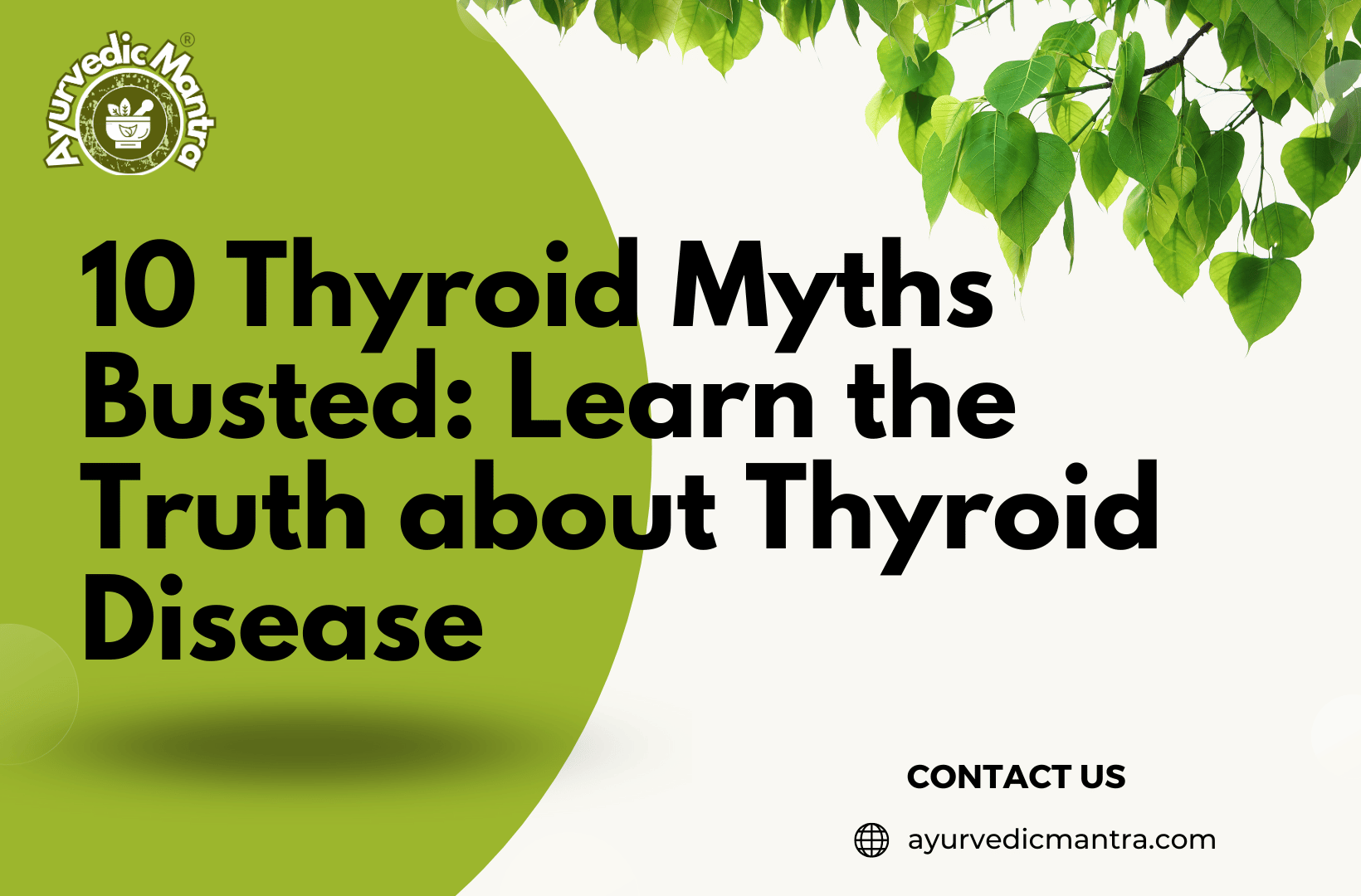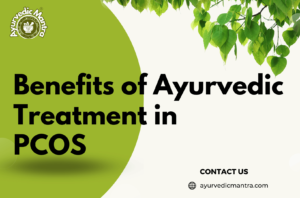
PCOD/PCOS: Ayurvedic Treatment is Best
Introduction Polycystic Ovary Disorder (PCOD) or Polycystic Ovary Syndrome (PCOS) is a common endocrine disorder affecting millions of women worldwide. It leads to hormonal imbalances,


The thyroid gland is a small, butterfly-shaped organ in the front of your neck. Despite its size, it significantly regulates various bodily functions, such as metabolism, energy production, and hormone balance. Due to its importance, the thyroid often becomes a topic of discussion, leading to various myths and misconceptions. This article will debunk 10 common thyroid myths and provide accurate information about thyroid disease.
Fact: While it is true that women are more likely to experience thyroid issues than men, thyroid problems can affect people of all genders. Hormonal changes during pregnancy and menopause can increase women’s risk of thyroid disorders. However, men can also develop thyroid conditions, and it is essential to recognize the symptoms early on to seek proper treatment.
Fact: Diagnosing thyroid disorders can be challenging as the symptoms often overlap with other health issues. Many thyroid problems remain undiagnosed for an extended period, leading to potential complications. If you experience unexplained fatigue, weight changes, or mood swings, you must consult a healthcare professional for a comprehensive evaluation.
Fact: Hypothyroidism (underactive thyroid) and hyperthyroidism (overactive thyroid) are prevalent thyroid disorders. Hypothyroidism affects many individuals, leading to symptoms like weight gain, fatigue, and hair loss. On the other hand, hyperthyroidism can cause weight loss, anxiety, and rapid heartbeat. Timely diagnosis and treatment can effectively manage both conditions.
Fact: While genetics can play a role in developing thyroid problems, they are not the sole factor. Environmental factors, dietary habits, and lifestyle choices also influence thyroid health. Exposure to certain chemicals or toxins, iodine deficiency, and chronic stress can contribute to thyroid issues.
Fact: Iodine is a crucial component for thyroid hormone production, but solely relying on iodized salt may not be enough to maintain optimal thyroid health. Consuming a balanced diet that includes other sources of iodine, such as seafood, dairy products, and seaweed, is essential. However, excessive iodine intake can also harm the thyroid, so moderation is key.
Fact: Thyroid medication, such as levothyroxine, is not addictive. It is a synthetic form of the thyroid hormone designed to supplement or replace the hormone in individuals with hypothyroidism. These medications are safe when prescribed by a healthcare professional and are not associated with addiction or abuse.
Fact: While thyroid imbalances can influence weight, not everyone with a thyroid disorder will experience significant weight changes. Hypothyroidism can lead to weight gain due to a slower metabolism, but hyperthyroidism can cause weight loss due to an increased metabolic rate. Other factors, such as diet and physical activity, also contribute to weight fluctuations.
Fact: Some natural supplements, such as selenium and zinc, may support thyroid function, but they cannot cure thyroid disorders. These supplements should be used as complementary therapies, not as replacements for medical treatment. If you suspect a thyroid problem, seek professional medical advice for accurate diagnosis and appropriate treatment.
Fact: Not all thyroid disorders have overt symptoms, especially early. Some individuals may experience mild or vague symptoms that are easily overlooked. Regular health check-ups and thyroid function tests are crucial, especially if you have a family history of thyroid problems or are at higher risk.
Fact: While a healthy diet is essential for overall well-being, it cannot guarantee the prevention of thyroid disorders. A balanced diet rich in nutrients, including iodine, selenium, and vitamin D, can support thyroid health. However, genetic predisposition and other factors can still contribute to developing thyroid issues.
Thyroid health is vital for the proper functioning of our bodies. With the prevalence of misinformation, it is crucial to debunk myths and ensure accurate knowledge about thyroid disease. If you suspect thyroid-related issues, consult a healthcare professional for proper evaluation and personalized treatment. Taking care of your thyroid health can positively impact your overall well-being and quality of life. Stay informed and proactive in managing your thyroid health for a happy and healthy life.
The thyroid is a small, butterfly-shaped gland in the front of your neck. Its primary function is to produce hormones that regulate various bodily processes, including metabolism, energy production, heart rate, and body temperature. These hormones are called triiodothyronine (T3) and thyroxine (T4), and they play a vital role in maintaining overall health and well-being.
The most common thyroid disorders include:
Thyroid disorders can have several causes, including:
Yes, there can be a genetic component to thyroid disorders. If you have a family history of thyroid problems, you may be at a higher risk of developing them. However, environmental factors, diet, and lifestyle choices also play a significant role in developing thyroid issues.
Diagnosing thyroid disorders involves a combination of physical examination, blood tests to measure hormone levels, and sometimes imaging tests like ultrasound or thyroid scans. Your healthcare professional will also consider your symptoms and medical history to make an accurate diagnosis.
Thyroid imbalances can potentially impact fertility in both men and women. Hypothyroidism and hyperthyroidism can disrupt the menstrual cycle, affect ovulation, and reduce sperm production, leading to fertility issues. Proper management of thyroid conditions is crucial for individuals trying to conceive.
Yes, chronic stress can negatively impact thyroid function. Stress triggers the release of cortisol, a hormone that can interfere with the production and conversion of thyroid hormones. Managing stress through relaxation techniques and lifestyle changes can benefit thyroid health.
Yes, pregnancy can have a significant impact on the thyroid gland. Hormonal changes during pregnancy can lead to gestational thyroiditis, where the thyroid becomes temporarily overactive and then underactive. Proper monitoring and management are essential to ensure a healthy pregnancy and protect the mother and baby’s well-being.
While adopting a healthy lifestyle, including a balanced diet and regular exercise, can support thyroid health, it may not be enough to manage thyroid disorders entirely. Medical treatment, such as thyroid hormone replacement therapy, is often necessary to regulate hormone levels effectively.
Thyroid medications are generally considered safe during pregnancy. Proper thyroid hormone levels are crucial for the baby’s brain development and overall growth. If you have a preexisting thyroid condition or are diagnosed with gestational thyroiditis during pregnancy, your healthcare provider will adjust your medication to ensure a healthy pregnancy.
While you cannot entirely prevent thyroid disorders, you can take steps to promote thyroid health. Ensure you consume enough iodine through a balanced diet, manage stress effectively, and avoid exposure to environmental toxins that may impact thyroid function. Regular health check-ups and early detection can help manage thyroid issues more effectively.
Treating and managing thyroid disorders depends on the condition and its underlying cause. Some cases, like iodine deficiency-related thyroid issues, can be corrected with appropriate supplementation. However, certain conditions may require lifelong management, such as hypothyroidism treated with hormone replacement therapy.
Untreated or poorly managed thyroid disorders can lead to various health complications. For instance, uncontrolled hyperthyroidism can affect the heart, leading to heart rhythm abnormalities and other cardiovascular issues. If left untreated, hypothyroidism can contribute to high cholesterol levels and an increased risk of heart disease.
Thyroid cancer is relatively rare compared to other types of cancer. However, the incidence has been increasing in recent years. The good news is that thyroid cancer often has a high survival rate when detected and treated early. Regular check-ups and prompt medical attention for suspicious thyroid nodules are essential for early detection and effective treatment.

Introduction Polycystic Ovary Disorder (PCOD) or Polycystic Ovary Syndrome (PCOS) is a common endocrine disorder affecting millions of women worldwide. It leads to hormonal imbalances,

Introduction Losing weight is a journey that requires dedication, consistency, and self-care. While there are numerous weight loss techniques out there, not all of them

Polycystic Ovary Syndrome (PCOS) is a hormonal disorder that affects millions of women worldwide. It can lead to various health complications, such as irregular periods,

In recent years, Ayurveda, an ancient system of natural healing originating from India, has gained significant popularity as an alternative approach to treating various health

आजकल वजन बढ़ने और चर्बी की वृद्धि होने की समस्या एक आम समस्या बन गई है। बढ़ते वजन और अतिरिक्त चर्बी के कारण न केवल

प्रस्तावना: आजकल वजन बढ़ने और ओबेसिटी की समस्या एक आम समस्या बन गई है। बढ़ते वजन के कारण न केवल शारीरिक समस्याएं होती हैं, बल्कि
